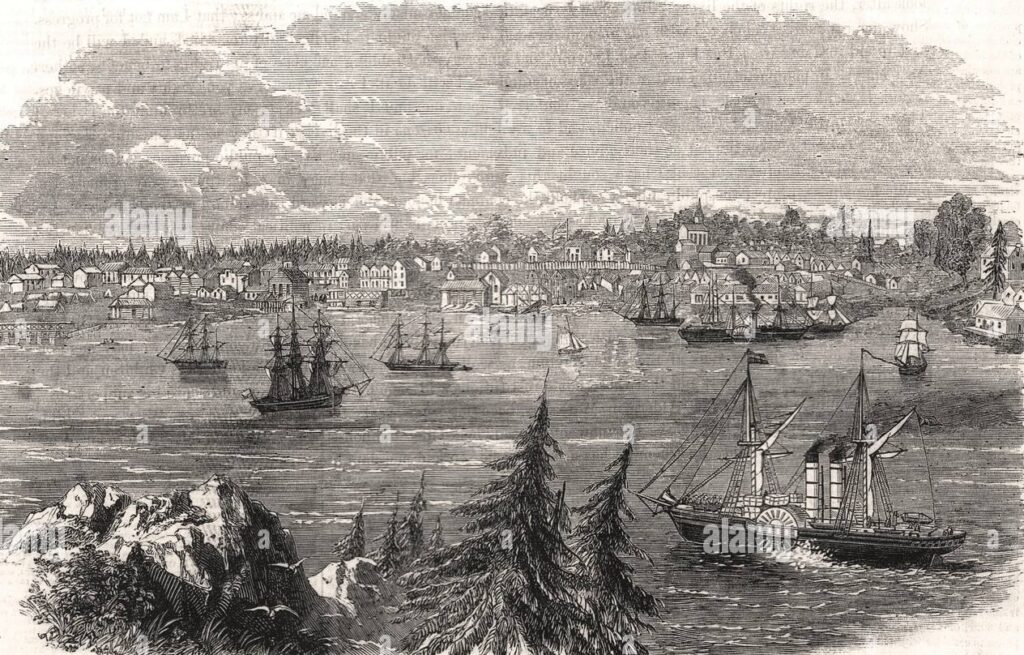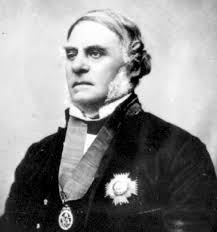The Year It All Began - 1858!
“It was the best of times, it was the worst of times, it was the age of wisdom, it was the age of foolishness, it was the epoch of belief, it was the epoch of incredulity, it was the season of Light, it was the season of Darkness, it was the spring of hope, it was the winter of despair. . .”

Charles Dickens’ famous quote from A Tale of Two Cities, might well have also applied to the year 1858 in then Fort Victoria, now British Columbia’s capital city. It was, in essence, a perfect description of the year when things really changed.
Thousands of transients and prospective miners descended upon the Fort; all intent upon seeking their fortune in the gold fields; all hoping for the best in a world that had gone mad with gold fever.
Of course, Fort Victoria was simply the stepping off point to the mines, so the hopeful miners still had another body of water to cross to reach the mainland and head for the Fraser River. This meant that every conceivable watercraft was put into use, from canoes to coffin-shaped roughly hewn vessels, none of which were adequate to challenge the waters of Active Pass and the Strait of Georgia. Many people drowned before they even reached the Fraser River.
Previously Victoria had been a sleepy little village with less than 300 inhabitants. Almost overnight Victoria became a tent town with as many as 6,000 immigrants. By the end of 1858 this number had stabilized at around 3,000. Victoria also had two competing newspapers by then and was growing by leaps and bounds in every way imaginable.

In his infinite wisdom, James Douglas, Chief Factor at the Fort, and later Governor of Vancouver Island, decided to set aside some government reserve land that year around Mount Douglas, then known as the Hill of Cedars. Eventually this land would become Mount Douglas Park which has recently reverted to its Indigenous name PKOLS.
Douglas was also faced with another problem that year. One group of passengers who had arrived aboard the Commodore, had not come to Victoria in search of gold but in search of freedom, far more precious than the yellow stuff. This group was a contingent of black immigrants who were escaping the bigotry experienced in America.
Here they were welcomed by Reverend Cridge and would receive assurance from Douglas that after residing here for seven years they would become British subjects, able to vote and enjoy all other privileges and rights shared by their fellow white man who bore allegiance to Queen Victoria. Unfortunately, there were many other Americans who arrived at the same time who had no use for the black man, and this presented numerous problems for Douglas, settling insults and rebuffs against the black immigrants. Eventually, many of these black people settled on Salt Spring Island.
Throughout the entire year, James Douglas also had his hands full settling mining disputes but the thing that bothered him more than anything was the fact that “American interests in New Caledonia [the initial name for British Columbia] far exceeded those of British residents.”
Douglas could foresee a time when Vancouver Island and most of British Columbia would become American territory, but with intrepid determination, Douglas hung on, and on a particularly wet and murky November day at Fort Langley, British Columbia was officially born. In London, Queen Victoria had given her suggestion for the new name of the area of Columbia declaring that the best possible name might in fact be British Columbia. It had a special historical importance, ensuring that the name of the empire was preserved and would no longer be American. The ceremony at Fort Langley marked the end of the old order and the beginning of a new era.
I have told the story of those early years in my book Providence, first in The McBride Chronicles series, followed by Destiny, Legacy and soon to be released Tomorrow. My characters, Gideon McBride and Jane Hopkins, lived through it all and survived to tell the tale. Why not look for yourself.
